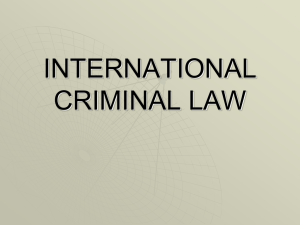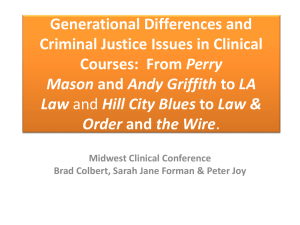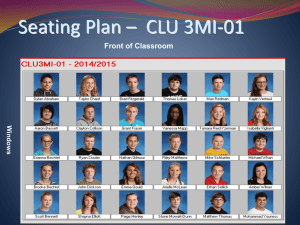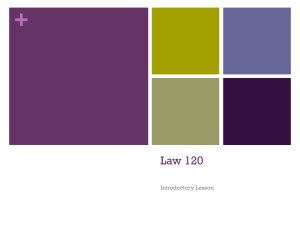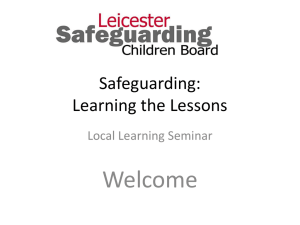Powerpoint
advertisement
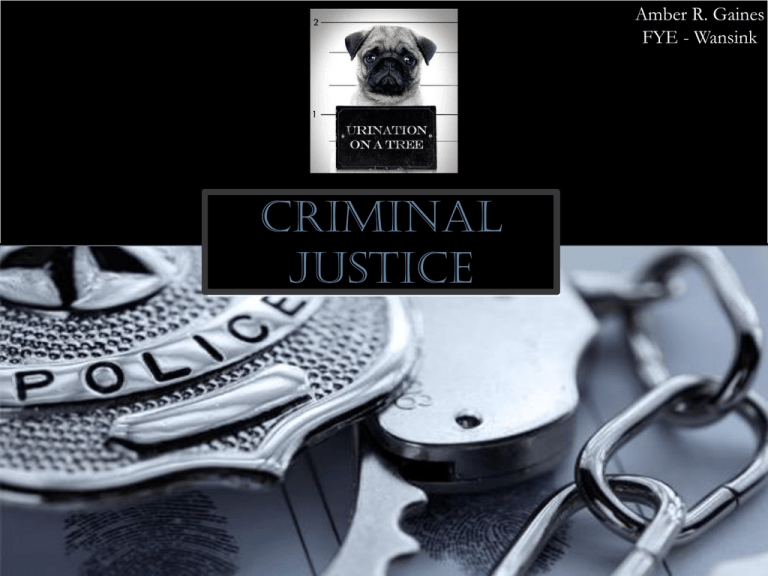
Amber R. Gaines FYE - Wansink Criminal Justice WHAT IS CRIMINAL JUSTICE? The criminal justice system is the set of agencies and processes established by governments to control crime and impose penalties on those who violate laws. There is no single criminal justice system in the United States but rather many similar, individual systems that have five components: Law Enforcement Prosecution Defense Attorneys Courts Corrections This offers extensive opportunities for jobs and careers of graduates who major in Criminal Justice that offer a substantial income starting from $38,000, and even more for those with a minor in other areas such as psychology and sociology. THE HISTORY OF CRIMINAL JUSTICE The basis of our Criminal Justice system is highly influenced by English law and customs that spread from the settlement people of Colonial America. Modern police forces began with Alfred the Great, an English king who ruled within the seventh century. Families that swore their allegiance to Alfred organized patrols in their regions, and appointed an official to oversee them which was called the “reeve” of the shire, later called a sheriff as we know today. Later on, between the American Revolution and Civil Wars, population growth and industrialization spurred the development of metropolitan police departments. THE HISTORY OF CRIMINAL JUSTICE (CONT.) Modern-day courts can date themselves back to the Pre-Revolutionary courts of America, which followed the laws of Great Britain. The American court system was plotted out by the U.S. Constitution that the states adopted in 1787. Fifth Amendment Sixth Amendment Fourth amendment Fifteenth amendment. THE HISTORY OF CRIMINAL JUSTICE (CONT.) Apart from our current ways of corrections, during Colonial times, the British penal system was used, which relied heavily on punishment and execution. During the 1800s, more states turned to imprisoning offenders rather than executing them or subjecting them to whipping, pillorying, or the stockade. Soon, the idea of reforming criminals took hold but was short lived as by the mid-1800s, reformers lost patience and focused on deterrence and rehabilitation. Many penitentiaries became reformatories. In time, Zebulon Brockway, created a system of inmate classification and parole. It was thought that criminals could be treated for their criminal habits with corrective therapies such as imposing total silence on the prison population and requiring inmates to wear striped uniforms. Today’s criminal justice programs focus on rehabilitating offenders who will eventually be released. Rehabilitation services ranging from job training to housing assistance are provided to offenders as they near their release dates. Course Number & Title Total W/ Internship Total W/o Internship 54 hours 44 hours A student majoring in Criminal Justice at Virginia Wesleyan is required to complete a minimum of 39 credit hours in specified coursework, 24 of which must be in criminal justice courses. The remaining 15 hours may be completed in areas of social science, humanities or natural sciences and mathematics. Semester Hours CJ 205 Issues in Criminal Justice 4 CJ 301 Criminology 4 CJ 350 Introduction to Social Research 4 CJ 387 Criminal Law 4 CJ 489 Senior Integrative Assessment 4 Six additional courses at any level, including one or two from the allied course list: CJ 210, 250, 300, 340, 348, 360, 385, 388, 389, 393, 400, 420, 460 24 Internship (optional) CJ 483 Internship Preparation (2 sem. Hrs.) CJ 484 Internship in Sociology & Criminal justice (8 semester hours) 10 Suggested Allied Courses (see advisor): SOC 270 Social Problems SOC 227 Social Psychology SOC 353 Applied Sociology POLS 371 Constitutional Law II: Substantive Rights PSY 350 Psychology and the Law MBE 203 Accounting II MBE 204 Accounting II MBE 216 Taxation SW 384 Drugs of Abuse SW 385 Substance Abuse & Chemical Dependency ART 208 Photography I COMM 222 Public Speaking SPAN 307 Topics in Advanced Conversation & Composition MATH 210 Statistics CHEM (any course) CS (any course) General Studies Requirements 105 English or English 001 Fall 120 Chemistry Intro Spring of Odd Yrs 233 Religious Battles in Court Aftr ENG 105 (Selctd Sem) 259 Literature of Mystery, Crime, & Nior L V T Required Courses Of Criminal Justice Major All Year 205 Issues In Criminal Justice Spring 301 Criminology All Year 350 Introduction to Social Research All Year 387 Criminal Law Junior/Senior 489 Senior Integrative Assessment Spring 385 Applies Criminal Profiling Fall of '15 & '17 388 Global Terrorism and Homeland Security (4) Spring (after 2 CJ classes) 389 Criminal Investigation (4) Fall 483 Internship Preparation All Year 210 Mathematics Statistics Intro I Q Spring 270 Social Problems & Social Solutions All year 100 Computer Concepts and Applications Required Courses of Sociology Minor All Year Spring Spring after SOC 100 (SAME as ENG 319) Fall 100 Introduction to Sociology 270 Social Problems and Social Solutions 345 Foundations of Sociology 319 Feminist and Gender Theory 311 Family S W W INTERNSHIP(S) Students may complete a 9-credit, 300-hour internship during the course of the semester. Examples of internship sites include: Local police departments State social services Probation/Parole District Corrections Courts U.S. Pre-Trial Services POST-GRAD ACQUIRED SKILLS Mediating/negotiating conflicts Understanding complex problems Skills You Will Gain as a Criminal Justice Major: Conceptualizing/implementing projects Interpreting issues and data Listening critically Engaging in appropriate ethical and professional behavior Understanding and appreciating human, socio-economic, cultural, and intellectual differences BEYOND THE CLASSROOM In VWC: Close to a 100% retention rate Between 80 and 85 percent of seniors in internships receive job offers upon graduation Employed in a number of fields and agencies, including: CIA FBI Secret Service Diplomatic Security Marshal’s Office Local and state government A PERSONAL PERSPECTIVE Fully aware that solving crime in reality is no-where near as perfect as on TV, since I was a child I was always drawn to mystery. I enjoy analyzing things and having physical evidence, and logic in order to support a claim, not just theory. I also have a passion for fairness and justice. Too many people lose loved ones and have no answers as to why or how. I want to do something to my best abilities to help. NECESSARY VALUES/CHARACTERISTICS Sociability Analytical Skills Honesty Attention to detail Reasonability Resolution PROFESSORS POINT OF VIEW Do you think that this Criminal Justice major is distinctive? “It is very different, unique, just as any other major is. Because of this, there is much effort to show that there is a separation from others while maintaining a pride in community. We focus on teamwork within the liberal arts for good training and making connections to other majors, not just within the Criminal Justice and Sociology departments. We promote diversity.” Quote: “I am a proud recovering lawyer, I’m still sober.” - Associate Professor Scott Liverman STUDENTS POINT OF VIEW - Khadijah Andrews: “What drew me in was the fact that I could help get the dangerous people of this world off of the street, also watching the work of a detective and a CSI drew me in. A pro is helping the [innocent] citizens and a con is the stereotypical thoughts of people outside of the criminal justice [system] view.” - Brittany Brandon: “I decided to venture off into another major because I decided to change my career path and take more specific classes. What I did like about the Criminal Justice major is that the classes are easy, and the terms seem like basic information. What I didn’t like was that in order to start the career I wanted, I had to go to school for a lot of years.”



